October 2023
Peripheral Neuropathy and Its Impact on Feet
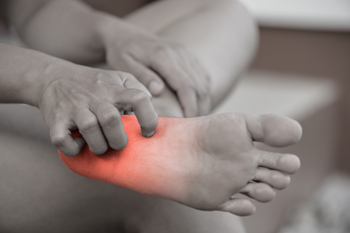
Peripheral neuropathy is a complex condition that affects the peripheral nervous system, leading to a range of symptoms that can significantly impact the feet. This disorder results from damage to the nerves outside the brain and spinal cord, often caused by various underlying conditions such as diabetes, infections, or autoimmune diseases. When it affects the feet, individuals may experience numbness, tingling, or a sensation of pins and needles. This can progress to sharp, shooting pain and muscle weakness. As the condition advances, it can lead to a loss of balance and coordination, increasing the risk of falls. The feet may also become more susceptible to injuries, blisters, and ulcers, with a reduced ability to detect pain or discomfort. Managing peripheral neuropathy often involves addressing the underlying cause, along with pain management and lifestyle adjustments. If you have symptoms of neuropathy, it is suggested that you schedule an appointment with a podiatrist who can perform routine foot exams which may help to prevent potential complications.
Neuropathy
Neuropathy can be a potentially serious condition, especially if it is left undiagnosed. If you have any concerns that you may be experiencing nerve loss in your feet, consult with one of our podiatrists from Bazzi Podiatry. Our doctors will assess your condition and provide you with quality foot and ankle treatment for neuropathy.
What Is Neuropathy?
Neuropathy is a condition that leads to damage to the nerves in the body. Peripheral neuropathy, or neuropathy that affects your peripheral nervous system, usually occurs in the feet. Neuropathy can be triggered by a number of different causes. Such causes include diabetes, infections, cancers, disorders, and toxic substances.
Symptoms of Neuropathy Include:
- Numbness
- Sensation loss
- Prickling and tingling sensations
- Throbbing, freezing, burning pains
- Muscle weakness
Those with diabetes are at serious risk due to being unable to feel an ulcer on their feet. Diabetics usually also suffer from poor blood circulation. This can lead to the wound not healing, infections occurring, and the limb may have to be amputated.
Treatment
To treat neuropathy in the foot, podiatrists will first diagnose the cause of the neuropathy. Figuring out the underlying cause of the neuropathy will allow the podiatrist to prescribe the best treatment, whether it be caused by diabetes, toxic substance exposure, infection, etc. If the nerve has not died, then it’s possible that sensation may be able to return to the foot.
Pain medication may be issued for pain. Electrical nerve stimulation can be used to stimulate nerves. If the neuropathy is caused from pressure on the nerves, then surgery may be necessary.
If you have any questions, please feel free to contact one of our offices located in Detroit, West Detroit, Northwest Detroit, Sterling Heights, Hamtramck, Dearborn Heights, Madison Heights, Redford, and Livonia, MI . We offer the newest diagnostic and treatment technologies for all your foot care needs.
Definition and Risk Factors for Cracked Heels
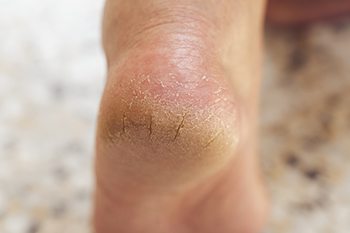
Cracked heels, also known as heel fissures, are a common foot condition characterized by dry, thickened skin with visible splits or cracks on the heels. These cracks can be superficial and painless, but in severe cases, they may deepen, bleed, or become painful, making walking and standing uncomfortable. Several factors contribute to the development of cracked heels, and some individuals are more susceptible than others. Dry skin, often due to inadequate moisturization or natural skin type, is a primary cause. The skin on the soles of the feet is naturally thicker and can become dehydrated, leading to cracking. Prolonged standing or walking, especially in ill-fitting shoes, can put excessive pressure on the feet and increase the risk. Additionally, underlying health conditions such as diabetes, thyroid disorders, and psoriasis can make an individual more prone to heel fissures. Effective prevention and treatment for cracked heels include regular moisturizing, wearing comfortable, well-fitting shoes, using foot supports, and addressing any underlying health concerns. If you have cracked heels, it is suggested that you make an appointment with a podiatrist who can prescribe effective medication for relief and recovery.
Cracked heels are unsightly and can cause further damage to your shoes and feet. If you have any concerns, contact one of our podiatrists from Bazzi Podiatry. Our doctors can provide the care you need to keep you pain-free and on your feet.
Cracked Heels
Cracked heels appear unappealing and can make it harder for you walk around in sandals. Aside from looking unpleasant, cracked heels can also tear stockings, socks, and wear out your shoes. There are several methods to help restore a cracked heel and prevent further damage.
How Do You Get Them?
Dry skin is the number one culprit in creating cracked heels. Many athletes, walkers, joggers, and even swimmers suffer from cracked heels. Age and skin oil production play a role to getting cracked heels as well.
Promote Healing
Over the counter medicines can help, especially for those that need instant relief or who suffer from chronic dry feet.
Wear Socks – Wearing socks with medicated creams helps lock in moisture.
Moisturizers – Applying both day and night will help alleviate dryness which causes cracking.
Pumice Stones – These exfoliate and remove dead skin, which allows for smoother moisturizer application and better absorption into the skin.
Change in Diet
Eating healthy with a well-balanced diet will give the skin a fresh and radiant look. Your body responds to the kinds of food you ingest. Omega-3 fatty acids and zinc supplements can also revitalize skin tissue.
Most importantly, seek professional help if unsure how to proceed in treating cracked heels. A podiatrist will help you with any questions or information needed.
If you have any questions, please feel free to contact one of our offices located in Detroit, West Detroit, Northwest Detroit, Sterling Heights, Hamtramck, Dearborn Heights, Madison Heights, Redford, and Livonia, MI . We offer the newest diagnostic and treatment technologies for all your foot care needs.
Causes and Symptoms of Achilles Tendinopathy
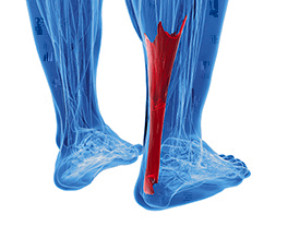
Achilles tendinopathy, or inflammation of the Achilles tendon, can hinder daily activities and mobility. The primary cause of Achilles tendinopathy is overuse, often prevalent among runners and others engaged in sports that involve repetitive stress on the Achilles tendon. This can lead to small tears and degeneration of the tendon, which connects the calf muscles to the heel. Those individuals with flat feet or over-pronated feet are at a higher risk. This can be a result of the flattened arches placing constant strain on the tendon, resulting in inflammation, pain, and swelling. Footwear choices, such as flip flops, sandals or high heels, can make the condition worse. Further, being overweight places extra stress on various body parts, including the Achilles tendon. A common symptom of Achilles tendinopathy is pain and tenderness in the back of the heel or ankle, which often gets worse with physical activity. Other symptoms can include stiffness in the ankle, reduced range of motion, and tendon swelling and thickening. Additionally, patents may experience a noticeable cracking or creaking sensation during movement. If you suspect you have Achilles tendinopathy or are experiencing any of these symptoms, it is suggested that you make an appointment with a podiatrist for a diagnosis and an appropriate treatment plan.
Achilles tendon injuries need immediate attention to avoid future complications. If you have any concerns, contact one of our podiatrists of Bazzi Podiatry. Our doctors can provide the care you need to keep you pain-free and on your feet.
What Is the Achilles Tendon?
The Achilles tendon is a tendon that connects the lower leg muscles and calf to the heel of the foot. It is the strongest tendon in the human body and is essential for making movement possible. Because this tendon is such an integral part of the body, any injuries to it can create immense difficulties and should immediately be presented to a doctor.
What Are the Symptoms of an Achilles Tendon Injury?
There are various types of injuries that can affect the Achilles tendon. The two most common injuries are Achilles tendinitis and ruptures of the tendon.
Achilles Tendinitis Symptoms
- Inflammation
- Dull to severe pain
- Increased blood flow to the tendon
- Thickening of the tendon
Rupture Symptoms
- Extreme pain and swelling in the foot
- Total immobility
Treatment and Prevention
Achilles tendon injuries are diagnosed by a thorough physical evaluation, which can include an MRI. Treatment involves rest, physical therapy, and in some cases, surgery. However, various preventative measures can be taken to avoid these injuries, such as:
- Thorough stretching of the tendon before and after exercise
- Strengthening exercises like calf raises, squats, leg curls, leg extensions, leg raises, lunges, and leg presses
If you have any questions please feel free to contact one of our offices located in Detroit, West Detroit, Northwest Detroit, Sterling Heights, Hamtramck, Dearborn Heights, Madison Heights, Redford, and Livonia, MI . We offer the newest diagnostic tools and technology to treat your foot and ankle needs.
Problematic Flat Feet
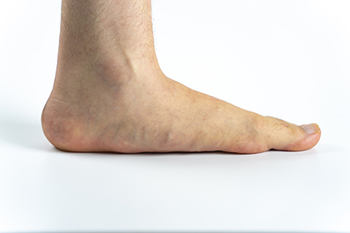
Flat feet, or fallen arches, occur when the entire sole of the foot makes contact with the ground. Generally harmless, flat feet are common in children until they develop an arch at about age 6. To check for flat feet, observe the inner part of the foot while standing. If it is flat on the floor, you have flat feet. While usually not problematic, some may experience pain, stiffness, or wear on their shoes. Treatments often include wearing supportive shoes, insoles, stretches, and painkillers but rarely require surgery. Causes can vary, from genetic predisposition to conditions affecting muscles and nerves. If you experience foot pain, stiffness, or balance issues, even if the condition is only in one foot, it is suggested that you make an appointment with a podiatrist who can suggest treatment options for relief.
Flatfoot is a condition many people suffer from. If you have flat feet, contact one of our podiatrists from Bazzi Podiatry. Our doctors will treat your foot and ankle needs.
What Are Flat Feet?
Flatfoot is a condition in which the arch of the foot is depressed and the sole of the foot is almost completely in contact with the ground. About 20-30% of the population generally has flat feet because their arches never formed during growth.
Conditions & Problems:
Having flat feet makes it difficult to run or walk because of the stress placed on the ankles.
Alignment – The general alignment of your legs can be disrupted, because the ankles move inward which can cause major discomfort.
Knees – If you have complications with your knees, flat feet can be a contributor to arthritis in that area.
Symptoms
- Pain around the heel or arch area
- Trouble standing on the tip toe
- Swelling around the inside of the ankle
- Flat look to one or both feet
- Having your shoes feel uneven when worn
Treatment
If you are experiencing pain and stress on the foot you may weaken the posterior tibial tendon, which runs around the inside of the ankle.
If you have any questions please feel free to contact one of our offices located in Detroit, West Detroit, Northwest Detroit, Sterling Heights, Hamtramck, Dearborn Heights, Madison Heights, Redford, and Livonia, MI . We offer the newest diagnostic and treatment technologies for all your foot and ankle needs.
How to Find Your Perfect Shoe Size
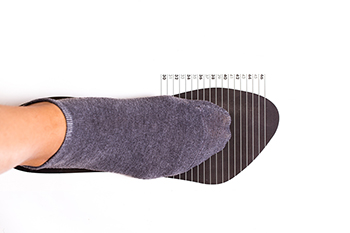
Finding the right shoe size is essential for comfort, foot health, and overall well-being. A poorly fitting shoe can lead to aches, pains, and even long-term problems. Begin by measuring your feet regularly, as their size can change over time. Using a Brannock device is an accurate method of obtaining the right shoe size. While trying on shoes, it is important to know that sizes can vary between brands and styles, so do not solely rely on the number. Pay attention to how the shoe feels. There should be enough room for your toes to wiggle, and the shoe should neither squeeze nor slip off your heel. Consider the shape of your feet, whether you have a high or low arch and any specific needs such as orthotic inserts. Walking around in the shoes can help to ensure they do not cause discomfort or pressure points. Keep in mind that your feet may slightly swell during the day, so it is wise to shop for shoes later in the afternoon. Prioritizing comfort and fit over style can help you to find the perfect shoe size. If you would like additional information about how to determine your correct shoe size, it is suggested that you speak to a podiatrist.
Getting the right shoe size is an important part of proper foot health. Seek the assistance of one of our podiatrists from Bazzi Podiatry. Our doctors will provide the care you need to keep you pain-free and on your feet.
Getting the Right Shoe Size
There are many people who wear shoes that are the incorrect size, negatively affecting their feet and posture. Selecting the right shoes is not a difficult process, so long as you keep several things in mind when it comes to choosing the right pair.
- When visiting the shoe store, use the tools available to measure your foot.
- Be sure there is ‘wiggle room’. There should be about an inch between your toes and the tip of your shoes.
- Do not always assume you are the same size, as manufacturers run differently.
- Purchase shoes later in the day, as your feet swell as the day progresses.
- If a shoe is not comfortable, it is not suitable. Most shoes can’t be ‘broken in’, and comfort should be the ultimate goal when it comes to choosing the right pair of shoes
As our feet hold our body weight and keep us moving, it is important to treat them right. Picking the right pair of shoes can provide your feet comfort and mobility without pain.
If you have any questions, please feel free to contact one of our offices located in Detroit, West Detroit, Northwest Detroit, Sterling Heights, Hamtramck, Dearborn Heights, Madison Heights, Redford, and Livonia, MI . We offer the newest diagnostic and treatment technologies for all your foot care needs.





